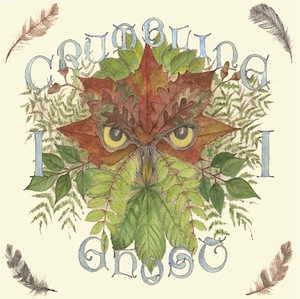What to make of Crumbling Ghost, purveyors of doom-infused psychedelic rock who use folk standards for their inspiration and incorporate the rhythms and cadences of traditional music in their sound?
You could say that they’re part of the same tradition and lineage promulgated by Rob Young in his book Electric Eden, modern day revivalists of pre-industrial English songs, taking up a musical narrative that stretches back hundreds of years and implicitly rejects the artifice of what passes for culture these days.
But I don’t think Crumbling Ghost are that interested in revival for the sake of it, despite nods to the likes of Shirley Collins, Bert Jansch and Fairport Convention on the back of their new album. Instead, I think that the thrilling, unnerving yet eminently accessible music they make is about connecting with the primal darkness at the heart of many traditional songs. While folk music will forever be associated in some peoples’ minds with cider drinking, Morris dancing and general hey-nonny-nonnying, much of the material is actually a bleak commentary on living in an age before man had mastered nature or created a civil society. It’s really not a nice place, but Crumbling Ghost have cannily identified it as a world that acts as a perfect backdrop for a doom-inclined English rock group.
II is, as the keen of mind will note, the group’s second album following their eponymous debut a couple of years ago. For what was essentially a self-released and barely promoted album, that record found itself making friends with writers including Stuart Maconie and Stewart Lee, as well as making The Times‘ end of year list. The new album is better produced and more fully realised, expunging the occasional whiff of anarcho crustiness found on the debut, and if justice prevails will make further inroads into the public consciousness (though they’ve still had to self-release it because mysteriously nobody else would).
II is also a good deal heavier, despite (or perhaps because of) the recruitment of a bona fide proper singer in Katie Harnett, whose voice provides sweet melodic contrast to the gloom-tastic riffs that abound on the album. (Though one of the curious pleasures of the debut was hearing guitarist John Mosley attempting to replicate the gnarled common tongue of an itinerant agrarian worker from the 16th century).
While the debut started with a field recording of the drizzly English countryside, the new album looms out of the speakers with a forbidding dronic pulse more akin to Sunn O))), chanting voices slowly pushing through the black fug like pilgrims lost in the night. When opening track ‘The Good Old Way’ bursts into life after this extended introduction, it sounds like a rousing, triumphant march out of the dark – but the vocals remain mixed down against the force of massed guitars, and reading the words, it becomes clear that, like many hymns, it’s actually a valedictory preparation for an early death, the good old way leading only to the next life “far beyond this mortal shore”.
‘Black Wax’ begins as a jaunty instrumental madrigal, but is rapidly slowed down to its bare bones (a recurrent Crumbling Ghost motif this), moving from repose to unease until a crushing rejoinder smacks the listener in the face like a sudden splash of dirty ditch water.
Another instrumental ‘La Rotta’ follows, based on a tune from medieval Italy which airily approximates the sound of ornate Euro guitar prog before that unnerving deceleration kicks in again, this time as a preface to the album’s one unrestrained passage of heads down, balls out NWOBHM-esque metal – a joyful incongruity that brings a smile to the face.
Which is just as well, because ‘Poor Murdered Woman’ is next up, a lyrical return to the theme of life as a meaningless vale of tears, nasty, brutish and short. The stark narrative is carried on a soaring melody line sung beautifully by Harnett, which in combination with the band’s sympathetic backing recalls straighter folk rock students such as Espers.
The track that casual listeners might be most familiar with is ‘Reynadine’, the story of a were-fox who seduces a woman, recorded by most of the luminaries of the original 60s/70s folk revival. However, I’m pretty sure that none of those versions featured an urgent, spiralling gallop of a riff in the middle that jangles the nerves before plunging down into the black soil again.
Extended instrumental ‘The Submerged Forest’ kicks off with a Can-like bass groove (‘You Doo Right’, to be precise) before working through a series of breakdowns that sound like something very bad staggering through the trees. It’s perhaps the one track that doesn’t quite come off, but the interludes of wordless vocalising and Turkish guitar are very pleasant.
The album ends in classic calm-after-the-storm fashion with ‘All Things Are Quite Silent’, an unadorned acoustic lament to a press ganged husband that offers a final reflection on the cruel and random nature of life as it was experienced when these songs were first sung. Once again, the effect is powerful and unsettling.
In looking back to go forward, Crumbling Ghost have accessed an ancient wellspring of abjection and fatalism that provides the perfect foundation for their baroque strain of psychedelic doom rock. Anybody interested in the uncanny zone of slippage between musical cultures and times occupied by artists as diverse as The Unthanks, Belbury Poly and Rose Kemp will find much to love in this album.


